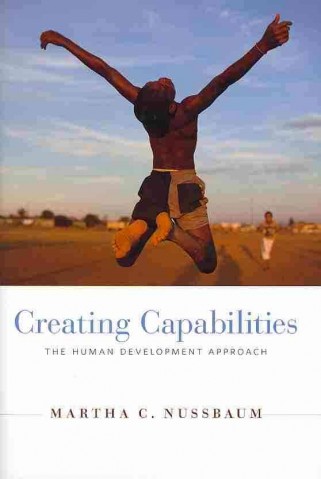Creating Capabilities (Nussbaum, 2011)
The following quotes are taken from Nussbaum's Creating Capabilities: The Human Development Approach, 2011. Largely building on Sen, and forging new paths for the capabilities approach, in this book Nussbaum attempts to summarize the approach for broader audiences, as it is often bogged down in weighty philosophical texts.
On the Capabilities Approach:
- "The Capabilities Approach can be provisionally defined as an approach to comparative quality-of-life assessment and to theorizing about basic social justice. It holds that the key question to ask, when comparing societies and assessing them for their basic decency or justice, is, "What is each person able to do and be?" In other words, the approach takes each person as an end, asking not just about the total or average well-being but about the opportunities available to each person. It is focused on choice or freedom, holding that the crucial good societies should be promoting for their people is a set of opportunities, or substantial freedoms, which people then may or may not exercise in action: the choice is theirs. It this commits itself to respect for people's powers of self-determination." (p. 18)
Beyond domestic responsibilities:
- "… today's world contains inequalities in basic life chances that seem unconscionable from the standpoint of justice. Just as it seems intolerable that a person's basic opportunities in life should be circumscribed by that person's race or gender or class, so too does it seem insupportable that basic opportunities should be grossly affected by the luck of being born in one nation rather than another. And yet such is the case. Life expectancy, educational and employment opportunities, and health – in short, all the items on the list – vary greatly across national boundaries, and these inequalities are rapidly increasing. Moreover, the influences that generate them are present from the very start of human life – and even earlier, since maternal nutrition and health care are a major source of unequal life opportunities. If basic justice requires that a person's entitlements not be curtailed by arbitrary features, then justice is ubiquitously violated in the current world order, and the bare existence of the inequality (pushing many people beneath the capability threshold) is reason enough to do something about it. " (p. 115)
Featured Posts
Tags
Ideology
Land
Policy
Politics
Sustainability
Capitalism
Post-doc
Racism
Colonization
Participation
Migration
Fellowship
Ethiopia
Culture
Climate change
International development
Development
Human Rights
Rural Development
Economics
Inequality
Resilience
Poverty
Democracy
Ethics
Agriculture
Colonialism
Gender
Africa
Civil society
Qatar
Revolution
Books
Conflict
Ethnography
Middle East
Governance
Interdisciplinary
South Africa
Anthropology
Leadership
Power
Institutions
decolonization
Education
Food Security
History
Globalization
Development Studies
Islam

